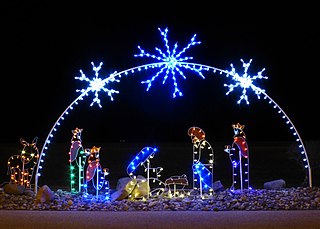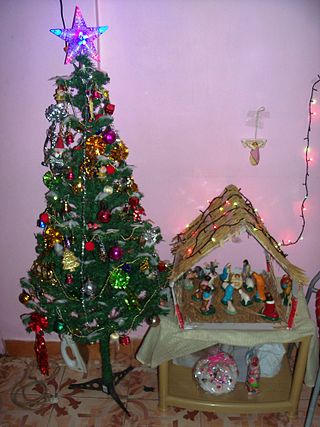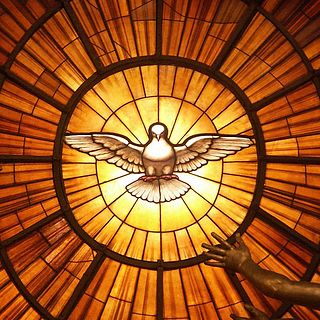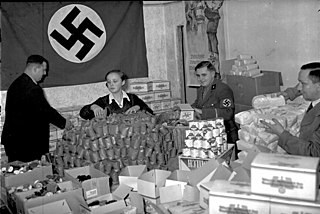
Christmas is an annual festival commemorating the birth of Jesus Christ, observed primarily on December 25 as a religious and cultural celebration among billions of people around the world. A liturgical feast central to Christianity, Christmas preparation begins on the First Sunday of Advent and it is followed by Christmastide, which historically in the West lasts twelve days and culminates on Twelfth Night. Christmas Day is a public holiday in many countries, is observed religiously by a majority of Christians, as well as celebrated culturally by many non-Christians, and forms an integral part of the annual holiday season.

The Seventh-day Adventist Church (SDA) is an Adventist Protestant Christian denomination which is distinguished by its observance of Saturday, the seventh day of the week in the Christian (Gregorian) and the Hebrew calendar, as the Sabbath, its emphasis on the imminent Second Coming (advent) of Jesus Christ, and its annihilationist soteriology. The denomination grew out of the Millerite movement in the United States during the mid-19th century, and it was formally established in 1863. Among its co-founders was Ellen G. White, whose extensive writings are still held in high regard by the church.

Advent is a season observed in most Christian denominations as a time of waiting and preparation for both the celebration of Jesus's birth at Christmas and the return of Christ at the Second Coming. It begins on the fourth Sunday before Christmas, often referred to as Advent Sunday. Advent is the beginning of the liturgical year in Western Christianity. The name comes from Latin adventus, translating the Greek parousia from the New Testament, originally referring to the Second Coming.

Christmas Eve is the evening or entire day before Christmas, the festival commemorating the birth of Jesus. Christmas Day is observed around the world, and Christmas Eve is widely observed as a full or partial holiday in anticipation of Christmas Day. Together, both days are considered one of the most culturally significant celebrations in Christendom and Western society.

The Advent wreath, or Advent crown, is a Christian tradition that symbolizes the passage of the four weeks of Advent in the liturgical calendar of the Western church. It is traditionally a Lutheran practice, although it has spread to many other Christian denominations.

Christmastide, also known as Christide, is a season of the liturgical year in most Christian churches.

The New World Order (NWO) is a term used in several conspiracy theories which hypothesize a secretly emerging totalitarian world government. The common theme in conspiracy theories about a New World Order is that a secretive power elite with a globalist agenda is conspiring to eventually rule the world through an authoritarian one-world government—which will replace sovereign nation-states—and an all-encompassing propaganda whose ideology hails the establishment of the New World Order as the culmination of history's progress. Many influential historical and contemporary figures have therefore been alleged to be part of a cabal that operates through many front organizations to orchestrate significant political and financial events, ranging from causing systemic crises to pushing through controversial policies, at both national and international levels, as steps in an ongoing plot to achieve world domination.

Saint Nicholas Day, also called the "Feast of Saint Nicholas", observed on 6 December in Western Christian countries, and on 19 December in Eastern Christian countries using the old church Calendar, is the feast day of Saint Nicholas of Myra; it falls within the season of Advent. It is celebrated as a Christian festival with particular regard to Saint Nicholas' reputation as a bringer of gifts, as well as through the attendance of church services.

An Advent calendar, from the German word Adventskalender, is used to count the days of Advent in anticipation of Christmas. Since the date of the First Sunday of Advent varies, falling between November 27 and December 3 inclusive, many reusable Advent calendars made of paper or wood begin on December 1. Others start from the First Sunday of Advent.
Progressive Christianity, formerly known as The Center for Progressive Christianity (TCPC), was founded in 1996 by, retired Episcopal priest, James Rowe Adams in Cambridge, Massachusetts. It is established in line with the larger progressive movement. The organization is an ecumenical network of affiliated congregations, informal groups, and individuals.

The observance of Christmas around the world varies by country. The day of Christmas, and in some cases the day before and the day after, are recognized by many national governments and cultures worldwide, including in areas where Christianity is a minority religion which are usually found in Africa and Asia. In some non-Christian areas, periods of former colonial rule introduced the celebration ; in others, Christian minorities or foreign cultural influences have led populations to observe the holiday.

The Catholic Charismatic Renewal (CCR) is a movement within the Catholic Church that is part of the wider charismatic movement across historic Christian churches.
"Gay agenda" or "homosexual agenda" is a pejorative term used by sectors of the Christian religious right as a disparaging way to describe the advocacy of cultural acceptance and normalization of non-heterosexual sexual orientations and relationships. The term originated among social conservatives in the United States and has been adopted in nations with active anti-LGBT movements such as Hungary, Uganda, Russia and Turkey.

The Christkind, also called Christkindl, is the traditional Christmas gift-bringer in Austria, Switzerland, Slovenia, southern and western Germany, the Czech Republic, Croatia, Liechtenstein, Luxembourg, the eastern part of Belgium, Portugal, Slovakia, Hungary, parts of northeastern France, Upper Silesia in Poland, parts of Latin America, in certain areas of southern Brazil, and in the Acadiana region of Louisiana.

Christmas is the celebration of the birth of Jesus Christ, which, in Western Christian churches, is held annually on 25 December. For centuries, it has been the subject of several reformations, both religious and secular.

Santa Claus is a legendary figure originating in Western Christian culture who is said to bring gifts during the late evening and overnight hours on Christmas Eve. Christmas elves are said to make the gifts in Santa's workshop, while flying reindeer pull his sleigh through the air.

Weihnachten is the observance of what is commonly known in English as Christmas in the German-speaking countries such as Germany, Austria and Switzerland. It is also widespread in countries with a German-speaking minority, such as Transylvania in Romania, South Tyrol in Italy, Eupen in Belgium, and various diasporas such as the German Brazilian and German American communities. Traditions of Weihnachten influenced Advent and Christmastide culture throughout the world.

Living Water International is a faith-based non-profit organization that helps communities in developing countries to create sustainable water, sanitation and hygiene (WASH) programs in response to the global water crisis. It is based in Houston, Texas, United States. It was established in 1990 and currently operates in 17 countries. As of 2024, the organization had completed more than 24,000 water projects which included drilling new water wells, harvesting water, and the rehabilitation of non-working wells. Living Water was a founding member of the Millennium Water Alliance, and is a member of the 58 Alliance, a coalition of Christian organizations united to help eliminate extreme poverty.

The celebration of Christmas in Nazi Germany included attempts by the regime to bring the Christian religious holiday into line with Nazi ideology. The Jewish origins of Jesus and the commemoration of his birth as the Jewish Messiah was troubling for some members of the Nazi Party and their racialist beliefs. Between 1933 and 1945, some government officials attempted to remove these aspects of Christmas from civil celebrations and concentrate on cultural pre-Christian aspects of the festival. However, church and private celebrations remained Christian in nature.
Charismatic Christianity is a form of Christianity that emphasizes the work of the Holy Spirit and spiritual gifts as an everyday part of a believer's life. It has a global presence in the Christian community. Practitioners are often called charismatic Christians or renewalists. Although there is considerable overlap, charismatic Christianity is often categorized into three separate groups: Pentecostalism, the Charismatic movement, and the neo-charismatic movement.

















